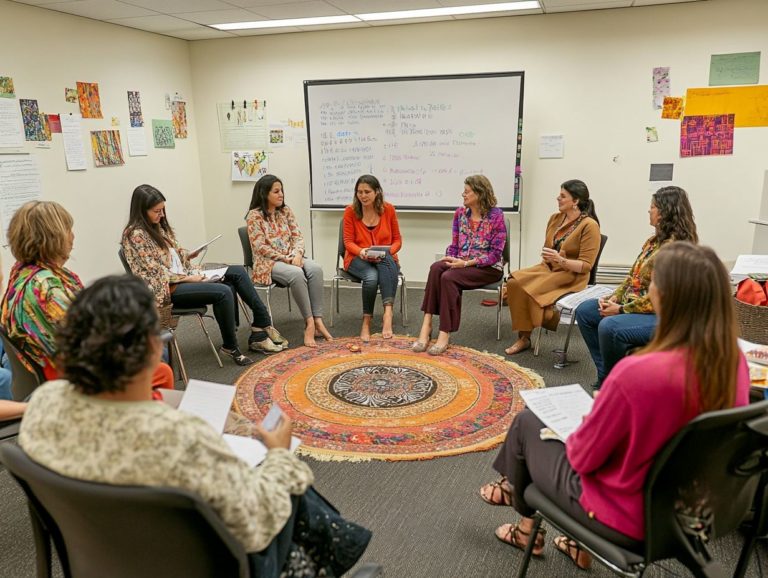49. The Benefits of Integrative Health for Children
In today s fast-paced world, ensuring that your children thrive both physically and emotionally is crucial.
Embrace integrative health practices now to unlock incredible benefits for your child’s future! Integrative health presents a holistic approach, blending traditional and additional treatments to enhance overall well-being.
This article explores the exciting benefits of integrative health for children, including improved overall health, reduced risks of chronic diseases, and the fostering of mental and emotional resilience.
It will also outline practical strategies for you to incorporate these practices into your children’s lives, laying the groundwork for a healthier future.
Contents
- Key Takeaways:
- Benefits of Integrative Health for Children
- Integrative Health Practices for Children
- How to Incorporate Integrative Health in Your Child’s Life
- Frequently Asked Questions
- What does integrative health mean for kids?
- What are the benefits of integrative health for children?
- What are some examples of integrative health practices for children?
- Is integrative health safe for children?
- Are there any age restrictions for integrative health for children?
- How can I incorporate integrative health practices into my child’s healthcare?
Key Takeaways:
- Integrative health promotes overall well-being and reduces chronic disease risk.
- It enhances mental and emotional health in children.
- Key components include nutrition, physical activity, mindfulness, and alternative therapies.

Defining Integrative Health
Integrative health takes a holistic approach to healthcare, emphasizing the importance of treating the whole person instead of merely addressing specific symptoms. It combines conventional medicine with additional treatments to elevate your overall well-being.
It acknowledges the intricate connections among health factors physical, emotional, and social encouraging collaboration between healthcare professionals and you to create personalized care plans that meet your unique needs.
At the heart of this paradigm is your engagement as a patient, enabling you to take an active role in your health journey. By fostering a cooperative environment, healthcare providers can integrate evidence-based practices that reflect the latest research, while being sensitive to your individual preferences.
A team of different health experts, including physicians, nurses, nutritionists, and therapists, plays a crucial role in optimizing treatment modalities. These may encompass mindfulness, acupuncture a method that uses thin needles to relieve pain and nutritional counseling.
Community services further enhance this ecosystem by providing resources such as support groups, wellness workshops, and preventive health screenings. Together, these elements embody a genuine commitment to holistic care, ensuring you receive comprehensive support on your wellness journey.
Benefits of Integrative Health for Children
Integrative health practices for children offer a wealth of benefits that significantly enhance their overall health and well-being. This approach, detailed in 64 integrative health approaches for family wellness, combines conventional and alternative therapies, elevating patient outcomes while nurturing family-centered care.
You ll find that it meets the needs of both the child and their family within a supportive healthcare environment, fostering a holistic sense of wellness.
Improved Overall Health and Well-being
Integrative health approaches can significantly enhance your child’s overall health and well-being by addressing both physical and psychological aspects of care. For instance, schools can implement 7 ways to promote integrative health, enabling healthcare providers to deliver comprehensive treatment strategies that promote holistic health.
By leveraging integrated care models, professionals can craft personalized care plans that include a variety of treatment modalities and psychological support. These tailored plans often feature nutritional interventions, such as introducing whole foods and anti-inflammatory diets that boost immune function.
Practices like mindfulness and yoga are increasingly included to alleviate stress and promote mental resilience, helping children navigate emotional challenges more easily.
Therapeutic modalities like massage therapy can also offer significant benefits, providing relief from chronic pain and anxiety. By encouraging healthy lifestyle changes such as regular physical activity, adequate sleep, and social connections children can embrace a balanced approach to their health.
Start today to ensure your child benefits from these vital health practices!
Reduced Risk of Chronic Diseases
Integrative health practices are especially advantageous for reducing the risk of chronic diseases in children. They emphasize prevention strategies that focus on lifestyle changes and tailored health education, as detailed in the science behind integrative health practices.
By weaving together specialized care and working together with doctors and nurses, you can help children adopt healthier habits. This significantly lowers their chances of developing chronic illnesses.
This holistic approach highlights the importance of nutritional modifications. It encourages families to embrace a balanced diet abundant in fruits, vegetables, and whole grains.
Increased physical activity is another essential element. It promotes enjoyable exercise routines that can easily fit into daily life.
These strategies enhance physical health and nurture mental well-being. This leads to greater patient satisfaction and better adherence to treatment plans.
By relying on evidence-based medicine, you enable healthcare services to be more effective. This allows families to take charge of their health together.
Enhanced Mental and Emotional Health

Integrative health places a significant emphasis on the mental and emotional well-being of children. It offers a comprehensive approach that includes psychological care, integrative health therapies, and family-centered support.
By addressing these essential components, healthcare providers can assist children in developing resilience and coping mechanisms. This elevates their overall emotional health.
Within this holistic framework, you ll find a variety of psychological support options available. This includes specialized counseling services designed to meet the unique needs of young individuals.
Effective stress management techniques include mindfulness practices and cognitive behavioral strategies. These are integral to this approach.
These methods furnish children with essential tools for navigating life s challenges. They also cultivate a nurturing environment through coordinated care practices.
Healthcare professionals play a crucial role in providing consistent support. They connect families with community services that address broader mental health issues.
By fostering a network of resources and enhancing communication among caregivers, educators, and emotional well-being specialists, they greatly enrich the therapeutic experience. This improves overall mental health outcomes for children.
Integrative Health Practices for Children
Integrative health practices for children encompass a diverse array of approaches that promote holistic health and well-being, including the benefits of nature in integrative health.
By seamlessly integrating nutrition, physical activity, mindfulness, and alternative therapies, these practices are tailored to meet each child’s unique needs.
These practices help children and families work together to improve health and happiness. They enable both children and their families to take an active role in their health journey, supported by healthcare providers who offer evidence-based solutions.
Nutrition and Diet
Good nutrition is a game changer for children’s health! It sets the stage for how they grow and thrive.
Nutrition is essential to integrative health for children. By adopting nutritional interventions and emphasizing family-integrated care approaches, you can make a significant impact on children’s health outcomes.
Ensuring that children receive adequate nutrition involves incorporating a variety of fruits, vegetables, whole grains, and lean proteins into their daily meals.
As a health professional, you play a pivotal role in guiding parents through dietary recommendations. This promotes healthy eating habits from the very beginning.
This proactive strategy enhances physical health, nurtures mental well-being, and boosts educational performance.
By engaging families in understanding preventive strategies, you can enable them to make informed choices.
Integrating therapies such as mindfulness and physical activity, along with a solid dietary foundation, creates a holistic framework. This supports a child’s overall health and resilience against chronic diseases.
Let’s empower children and families to take charge of their health today!
Physical Activity and Exercise
Physical activity and exercise play a crucial role in holistic health, offering a wealth of benefits that significantly enhance children’s overall health and well-being.
As a healthcare provider, you should actively encourage children to adopt an active lifestyle and embrace exercise as a powerful tool to boost physical fitness. This also helps address lifestyle changes that can ward off chronic diseases.
The recommended guidelines suggest that children should engage in at least 60 minutes of moderate to vigorous physical activity each day. This can include a delightful mix of aerobic activities, like running, muscle-strengthening exercises, such as push-ups, and bone-strengthening activities, like jumping.
These activities foster not just physical health but also emotional and social development.
Holistic health approaches spotlight the importance of community services, such as after-school programs and recreational sports. These create more avenues for children to engage in regular exercise.
These strategies serve all children and promote overall health, ensuring every child has access to safe and engaging environments where they can cultivate healthy habits.
Mindfulness and Stress Management
Mindfulness practices and stress management techniques are increasingly recognized as essential components of holistic health for children. They enable kids to enhance their emotional well-being and effectively navigate challenges.
By incorporating mindfulness into healthcare settings, you can provide children with invaluable tools to manage stress and cultivate resilience.
These techniques often encompass:
- Deep breathing exercises
- Guided imagery
- Straightforward meditation practices aimed at engaging a child’s imagination and promoting relaxation
Activities such as yoga can serve as physical outlets for energy and anxiety, helping kids connect their mind and body.
It s vital for family-centered care to involve parents and guardians, equipping them with effective strategies to support their children at home.
By engaging children in open dialogues about their feelings and encouraging self-expression, you further enable them. This ultimately paves the way for a more balanced emotional landscape.
Alternative Therapies

Alternative therapies, encompassing a variety of non-conventional approaches, play a significant role in holistic health practices for children, offering additional treatment options that enhance overall wellness.
These therapies complement standard medical care, providing pathways for psychological support and promoting holistic health improvements. For example, acupuncture has been shown to alleviate pain and stress, aiding in the management of various health conditions.
Meanwhile, yoga promotes physical flexibility and emotional stability, making it particularly beneficial for children dealing with anxiety.
Aromatherapy, with its soothing essential oils, brings a calming effect that enhances relaxation and improves sleep quality elements crucial for children’s growth and development.
By thoughtfully incorporating these therapies into treatment plans, healthcare providers can elevate patient outcomes, enabling children and their families to take an active role in their wellness journey.
How to Incorporate Integrative Health in Your Child’s Life
Incorporating holistic health into your child’s life requires a collaborative approach that brings together guidance from healthcare providers and the active participation of the family. This ensures that your child’s unique needs are addressed holistically.
Start integrating holistic practices today to support your child s health!
By embracing a variety of strategies, you can create an environment that nurtures your child’s physical, emotional, and psychological well-being.
Consult a healthcare provider for personalized strategies to enhance your child’s wellness journey.
Tips and Strategies for Parents
Parents play a crucial role in fostering overall health for their children by embracing specific strategies that promote well-being and emotional resilience.
Engage in family integrated care practices and provide psychological support to create nurturing environments that enhance your children’s health outcomes.
Consider implementing a balanced meal plan that emphasizes fresh fruits, vegetables, whole grains, and lean proteins while minimizing processed foods.
Get your kids moving! Regular physical activity not only boosts their physical health but also elevates mood and enhances cognitive function.
Incorporating mindfulness practices, such as deep breathing exercises or meditation, into daily routines can help children manage stress and develop emotional regulation skills.
Understand healthcare barriers. Emphasize the importance of good nutrition. This enables your children to maintain a healthy lifestyle while advocating for necessary healthcare training that addresses essential components of well-being.
Frequently Asked Questions
What does integrative health mean for kids?
Integrative health combines standard and alternative treatments to boost kids’ overall wellness.
What are the benefits of integrative health for children?

Integrative health provides a holistic approach, addressing physical, emotional, and mental well-being. It can help prevent and treat chronic conditions, improve sleep, boost immunity, and promote overall wellness.
What are some examples of integrative health practices for children?
Examples include acupuncture, massage therapy, herbal remedies, yoga, meditation, and nutrition counseling.
Is integrative health safe for children?
Yes, integrative health practices are generally safe when performed by qualified practitioners. Always consult with a healthcare provider before starting any new treatments for your child.
Are there any age restrictions for integrative health for children?
Integrative health practices can benefit children of all ages, from infants to teenagers. For new parents, exploring integrative health practices can be especially valuable. Certain therapies may be more appropriate for specific age groups, so consult with a healthcare provider first.
How can I incorporate integrative health practices into my child’s healthcare?
Incorporate integrative health practices by discussing options with your child’s healthcare provider and seeking qualified practitioners. It’s also essential to involve your child in the decision-making process and educate them about the benefits of naturopathy for children to support their overall well-being.






